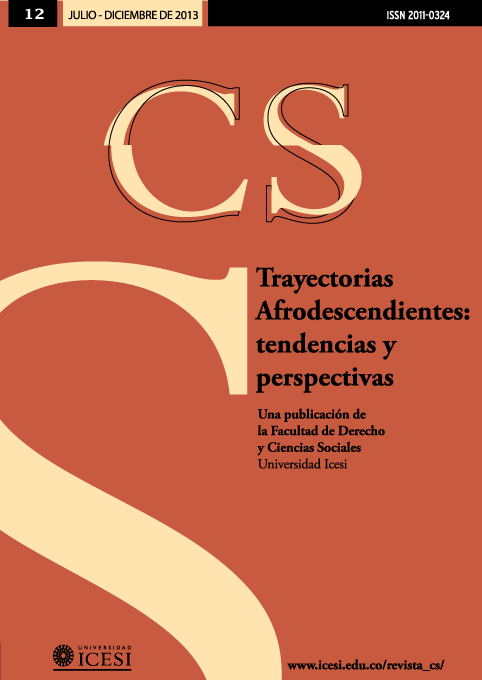Metaphor, Prosopopeia, and the Weapon of Language in Autobiography of a Slave by Juan Francisco Manzano
DOI:
https://doi.org/10.18046/recs.i12.1684Keywords:
Juan Francisco Manzano, Autobiography, Language, Testimony, NarrativeAbstract
This article is a narrative analysis of Juan Francisco Manzano (1797–1853)'s Autobiografía de un esclavo (1835). It aims to give visibility to Juan Francisco Manzano as a 19th century Cuban intellectual and situates his writings within the afrodiasporic and Afrolatino ancestral heritage. The article examines the literary strategies deployed by the author in writing his testimonies such as intertextual figures in the picaresque prose and his privileged position as a narrator that deliberately mixes different aspects of his narrative disturbing the readership. Finally, the article presents an analysis of the metaphoric language deployed by Manzano through the interpretation of recurring themes in his autobiography. James Olney and Paul de Man's theoretical framework are deployed to build an argument on the multiplicity of 'self ' and/or 'voices' that emerge from the Manzanian metaphoric narrative.
Downloads
References
Andrews, W. L. (Ed.). (1993). African American Autobiography: A Collection of Critical Essays. New Jersey, Estados Unidos: Prentice Hall.
Bhabha, H. K. (1994). The Location of Culture. New York, Estados Unidos: Routledge.
Branche, J. (2001). ''Mulato entre negros' (y blancos)': Writing, Race, the Antislavery Question, and Juan Francisco Manzano's Autobiography. Bulletin of Latin American Research, 20 (1), 63–87.
Burton, Gera. (2004). Ambivalence and the Postcolonial Subject: the Strategic Alliance of Juan Francisco Manzano and Richard Robert Madden. New York, Estados Unidos: Peter Lang Publishing.
Yacou, Alain. (2004). Un esclave–poète à Cuba au temps du péril noir: Autobiographie de Juan Francisco Manzano (1797–1851). París, Francia: Karthala.
Butterfield, S. (1974). Black Autobiography in America. Amherst, Estados Unidos: University of Massachusetts Press.
Césaire, Aimé. (1972). Discourse on Colonialism. New York–London: Monhly Review Press.
De Man, P. (1979). Autobiography as De–Facement. MLN, 94, 919–930.
Eakin, P. J. (1991). Autoinvención en la autobiografía: el momento del lenguaje. En Á. G. Loureiro, La autobiografía y sus problemas teóricos (pp. 79–92). Barcelona, España: Antropos.
Friol, R. (1977). Suite para Juan Francisco Manzano. La Habana, Cuba: Arte y Literatura.
Foster, F. S. (1979). Witnessing Slavery: The Development of Ante–bellum Slave Narrative. Madison, Estados Unidos: University of Wisconsin Press.
Friedman, E., Valdivieso, T. y Virgilio, C. (2004). Aproximaciones al estudio de la literatura hispánica. New York, Estados Unidos: McGraw–Hill.
Gilmore, L. (2001). The Limits of Autobiography: Trauma and Testimony. Ithaca, Estados Unidos: Cornell University Press.
Gusdorf, G. (1956). Conditions et limites de l'autobiographie. En Formen der Selbsdarstellung. Berlín, Alemania: Gunter Reichenkron.
Holte, J. C. (1988). The Ethnic I: A Sourcebook for Ethnic–American Autobiography. New York, Estados Unidos: Greenwood Press.
Jiménez, L. A. (1995). Nineteenth Century Autobiography in the Afro–Americas: Frederick Douglass and Juan Francisco Manzano. Afro–Hispanic Review, 14 (2), 47–52.
Labrador Rodríguez, S. (1996). La intelectualidad Negra en Cuba en el siglo XIX: El caso de Manzano. Revista iberoamericana, 62 (174), 13–25.
Leante, C. (2003). Francisco y Juan Francisco. Cuadernos Hispanoamericanos, 641 (Nov), 49–61.
Lewis Galanes, A. (1991). Poesías de J. F. Manzano esclavo en la isla de Cuba. Madrid, España: Betania.
Lourerio, Á. G. (1991). La autobiografía y sus problemas teóricos. Barcelona, España: Antropos.
Luis, W. (Ed.). (2007). Juan Francisco Manzano: Autobiografía del esclavo poeta y otros escritos. Madrid, España: Iberoamericana Vervuert.
Manzano, J. F. (1996). Autobiography of a Slave. Detroit, Estados Unidos: Wayne State University Press.
Manzano, J. F. (1835). Autobiografía de un esclavo: Manuscrito. La Habana, Cuba: Biblioteca Nacional.
Miller, M. (2005). Rebeldía Narrativa, Resistencia Poética y Expresión 'Libre' En Juan Francisco Manzano. Revista Iberoamericana, 71 (211), 417–436.
Molloy, S. (1989). From Self to Self: The Autobiography of Juan Francisco Manzano. MLN, 104 (2), 393–417.
Mullen, E. J. (Ed.). (1981). The Life and Poems of a Cuban Slave: Juan Francisco Manzano, 1797–1854. Connecticut, Estados Unidos: Archon Books.
Olney, J. (1988). Studies in Autobiography. New York, Estados Unidos: Oxford University Press.
Olney, J. (1972). Metaphor of the Self. Princeton, Estados Unidos: Princeton University Press.
Payne, J. R. (1992). Multicultural Autobiography: American Lives. Knoxville, Estados Unidos: University of Tennessee Press.
Popkin, J. D. (2005). History, Historians & Autobiography. Chicago, Estados Unidos: University of Chicago Press.
Richmond Ellis, R. (1998). Reading through the Veil of Juan Francisco Manzano: From Homoerotic Violence to the Dream of a Homoracial Bond. PMLA, 113 (3), 422–435.
Russo, J. P. (2005). The Future Without a Past: The Humanity in a Technological Society. Columbia, Estados Unidos: University of Missouri Press.
Sekora, J. (1982). The Art of Slave Narrative: Original Essays in Criticism and Theory. Macomb, Estados Unidos: Western Illinois University.
Schulman, I. A. (Ed.). (1975). Autobiografía de un esclavo. Madrid, Estados Unidos: Guadarrama.
Vera–León, A. S. (1991). Juan Francisco Manzano: el estilo bárbaro de la nación. Hispamérica, 20 (60), 3–22.
White, H. (1978). Tropics of Discourse: Essays in Cultural Criticism. Baltimore, Estados Unidos: Johns Hopkins University Press.
Williams, R. L. Jr. (2000). African American Autobiography and the Quest for Freedom. Westport, Estados Unidos: Greenwood Press.
Weintraub, K. J. (1975). Autobiography and Historical Consciousness. Critical Inquiry, 1 (4), 821–848.
Downloads
Published
Issue
Section
License
Copyright (c) 2013 Carmen Cosme Puntiel

This work is licensed under a Creative Commons Attribution-NonCommercial 4.0 International License.
© Reserved Copyright
Material in this publication may be reproduced without authorization, provided the title, author and institutional source is acknowledged.
The content published in Revista CS is distributed under the Creative Commons BY-NC 4.0 Attribution/Recognition-NonCommercial 4.0 International license.
You are free to:
Share — copy and redistribute the material in any medium or format.
Adapt — remix, transform, and build upon the material.
Under the following terms:
Attribution — You must give appropriate credit , provide a link to the license, and indicate if changes were made . You may do so in any reasonable manner, but not in any way that suggests the licensor endorses you or your use.
NonCommercial — You may not use the material for commercial purposes.












